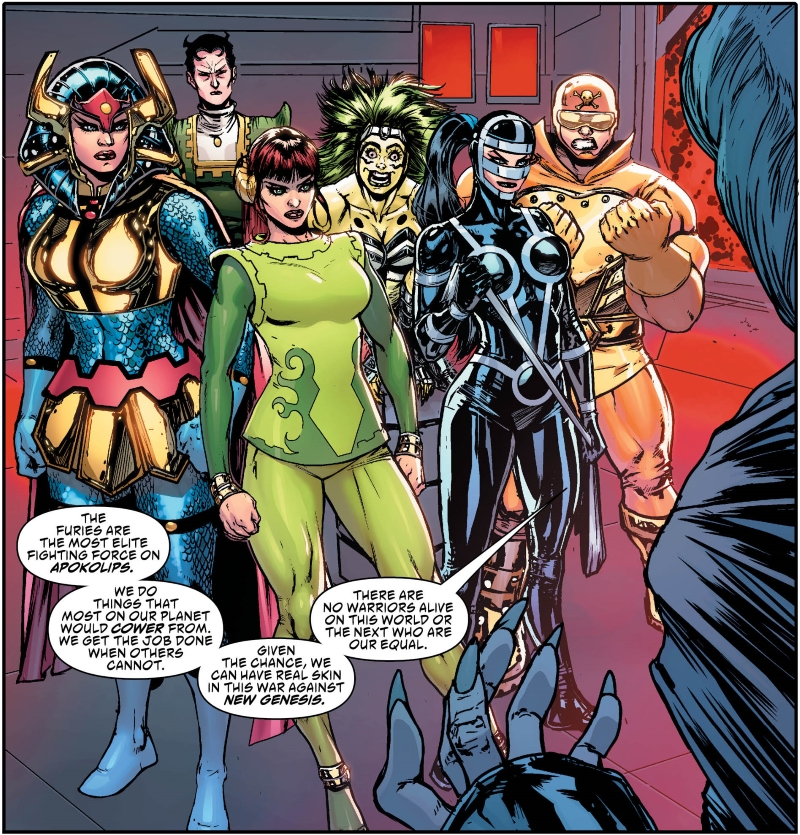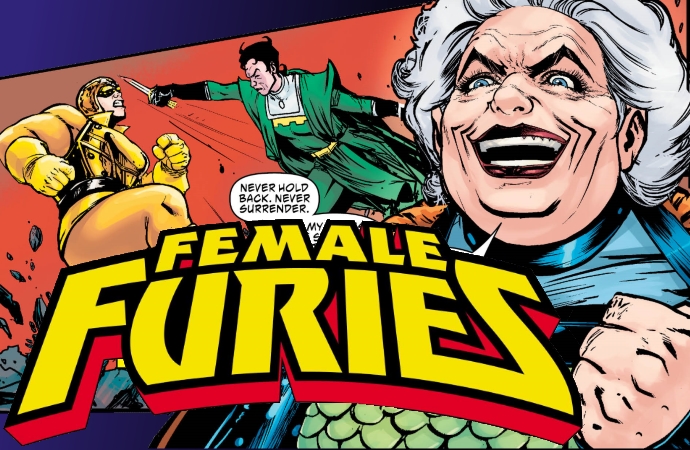Female Furies #1
Cecil Castellucci (Writer), Adriana Melo (Artist), Carlos M. Mangual (Letters), Hi-Fi (Color)
DC Comics
February 6, 2019
No buried ledes here–I love this book.
Female Furies is a six-issue miniseries that tells the backstory of the most elite fighting force of Apokolips, the group that trained DC heroine Big Barda, before she defected from its ranks and fled the planet. This first issue is nothing short of incredible.
There’s no slow build, no quiet lead-in. The first issue opens with a splash page that gives a brief synopsis of the group and a declaration of intent by their leader, Granny Goodness. From there the book jumps back and forth between two stories–the training of these Furies and the career path of Goodness herself that led to their founding.

Goodness’ path is…not an easy one. One of Darkseid’s elite soldiers, she’s by his side when he stages the coup that gives him the throne. She works hard to earn his respect as a general and a warrior; faced with rampant sexism and misogyny on all sides, she knows that she must be twice as good as any of the men under Darkseid’s command. She’s unflinching, merciless in her decision-making, making great sacrifices and often for little gain. She doesn’t really have a chance–not just for the metanarrative necessity created by this being a prequel, but also against the sheer mass of misogyny and contempt she faces from her peers. She’s better than all of them, but alone; together, they conspire around her, humiliate her.
Goodness ends up in charge of Apokolips’ orphanage; this too is a necessity, as it was her established role with in the DC Universe long before this series came about. Moments like these are where Castellucci shines as a writer; someone less experienced in navigating a patriarchy might have glossed over this appointment, or if they did recognize and present the profound injustice that it is, they might’ve done so with only a token resistance on the part of our dear Granny. Castellucci though is inured to navigating such systems and their oppression, and it shows; when Darkseid or Desaad speak down to Goodness, it’s with the voice of any office manager who denigrates a female employee’s capability. When Goodness submits to indignities in the service of Darkseid, she does so grimly, with an understanding that there’s no guarantee these sacrifices will reap a reward; indeed, they often don’t.

This story is both compared and contrasted (explicitly and intentionally!) against the story of the women Granny Goodness must train; her Female Furies are held to the same rigorous standards as any of Apokolips’ male soldiers, a detail that Goodness herself ensures. Despite this, and due to an “old custom,” the women are subjected to indignities that no man must endure as a part of their review process; women raised and trained as warriors are evaluated on their skill at cooking, their presentability, and their ability to smile. They aren’t good at any of these, because they’ve grown up on a hell planet and trained only for battle, and yet these are the criteria that Darkseid and his male advisors use to bar them from joining Darkseid’s army. It’s humiliating for the women, and it’s galling and infuriating to witness as a reader, exactly as it should be.
Castellucci’s skills as a writer aren’t limited to plotting; the book seethes with dialogue that is almost exhausting to read in its relentlessness. It’s been a commonly held wisdom that most creators don’t really know what to do with the New Gods; aside from their creator, Jack Kirby, and later Walt Simonson, they’re a difficult property to work with because they don’t really play well with the established DC pantheon on a long term basis. New Genesis and Apokolips quite frankly have their own things to do. Castellucci blows that conventional wisdom apart, though; for all that it packs the power of a modern examination of the way various waves of feminism inform and interact with each other, it reads like a Silver Age book, all strong declarations and dramatic personal statements. Honestly, if DC’s smart and Castellucci’s willing, they’ll give her the keys to this particular kingdom; she could easily write an epic on par with those earlier greats.
Castellucci is aided in this storytelling by the work of Adriana Melo, who imbues the entire story with a sense of simmering rage. None of the Furies are posed provocatively at any point in the story. Even when the men under Darkseid’s command are leering at them or commenting on their appearances, Melo’s art makes it clear that it is done without their knowledge, consent, or approval. When they’re forced to present a traditional pretense at femininity, they do so sullenly, reluctantly, and that too carries in their poses, their expression. It’s very simply and clearly not what they do, and they resent it.

Melo also shows skill with depicting characters as they appear across different time periods; the Goodness of the modern day has earned that Granny title; she’s heavyset, with wild hair and bags around her eyes. Her younger counterpart during the era of Darkseid’s ascendancy is leaner, fitter, and the differences read as natural for the requirements each version of the character is subject to. Younger Goodness (not young, mind you), has the leanness of a fighter, and uses it as thus; while older Goodness is thicker, it’s not softness, but the packed, dense muscle of someone who has kept a regular training regimen for decades, despite a body that is trying to slow with age. Either of them could break you, reader, and you might thank them for the privilege.
Comics coloring studio Hi-Fi provides colors for the issue, and they’re used to just as great an effect as both the writing and art; time skips are depicted with an entirely different coloring technique, which is the sort of thing that I will always, always love. The “current” scenes of the book, involving the training of the Furies, are colored in a standard modern fashion, while the flashback scenes depicting Darkseid’s coup and the power struggles among his lieutenants immediately afterward are colored in a classic, flatter style. This, combined with Melo’s earlier-mentioned ability to depict the same woman at two different ages, is as in-your-face as the rest of the book, resulting in two panels of Goodness glaring out at the reader, from two different time periods, and bearing the same cold rage. It’s compelling and enticing, and the fact that it happens on the first two pages of the book only makes it more exciting.
Female Furies is a book that deserves every accolade that comics, as an industry, can give; it’s smart, insightful, and it’s brimming with the kind of cleverness and rage that Bitch Planet made waves with a few years back. In an era full of far, far too many superhero books that have centered around heroes sadly moping about their woes, Female Furies is an incandescent candle, reminding cape comics what they’re really capable of.


